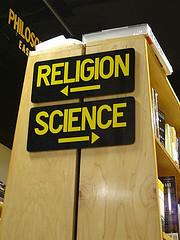
Every Monday, “Science and the Sacred” features an essay from
one of The BioLogos Foundation’s co-presidents: Karl Giberson and
Darrel Falk. Today’s entry was written by Karl Giberson.
Two curiously related things happened to me last month. The first was a request from the college bookstore for my book orders for the Logic course I will be offering this spring. The second was an “Open Letter to Karl Giberson” posted on an anti-evolution site accusing me of not understanding elementary Logic! My immediate reaction, of course, was to cancel my Logic course based on this new revelation that I was unqualified to teach it. After reading the “Open Letter” I realized that I was being provided with a golden opportunity for a warm-up presentation in basic logic, and one with an audience of more than the 8 or 10 students that I will see in the spring. So let me wax logical for a few moments and unfold an often-confused aspect of the relationship between Logic and scientific reasoning.
Logic courses look closely at arguments built around common, but subtle, errors in reasoning. Such arguments appear to establish conclusions when, in fact, they do not. Many such fallacies are so widely used and so effective that they have Latin names and were once studied as a part of all liberal arts curricula. These fallacies are in constant use today as the following examples will indicate.
Consider the common ad hominem logical fallacy that occurs when we try to undermine a conclusion by attacking the people who hold that conclusion. Efforts to undermine evolution by claiming that Darwin was a racist, or a sexist, or an inspiration to Hitler are textbook examples of this fallacy. The viability of evolution is unrelated to whatever personal flaws Darwin may or may not have had or whatever nefarious programs appealed to its logic. This fallacy is so effective, however, that anti-evolutionists eager to undermine Darwin’s theory enthusiastically churn out books and videos trying to establish a connection between Darwin and Hitler, so stench from the latter will rub off on the former. Many readers of such books erroneously conclude that the theory of evolution has somehow been undermined by this argument, as if it derives its credibility from its originator, rather than from evidence.
There are many such fallacies studied in Logic and the one I am being accused of is affirming the consequent. A typical example goes like this: If God designed a structure, like the bacterial flagellum, then science will be unable to explain its origin. Science cannot explain the origin of the bacterial flagellum. Therefore God designed this structure. In this argument the truth of the consequent–science cannot explain the origin of a certain structure–is said to establish the truth of the antecedent–God designed the structure. This is a logical fallacy because we can imagine another explanation. Suppose, for example, that science is unable to provide the desired explanation because some important discoveries have not yet been made. This would imply the same consequent. If both A and B imply C, then the truth of C can hardly be a proof of A and not B.
This problem has a subtle connection to the so-called scientific method. My anti-evolutionary critic states, correctly: “It is a logical fallacy to conclude that confirmed predictions prove the theory (evolution) to be true.” The problem here relates to the nature of scientific claims, however, not to logic. This distinction is, unfortunately, often overlooked.
When science was born in the 17th century, there was a widely shared belief that knowledge should be absolute, and possess the sort of certainty we enjoy when we state that 2 + 2 = 4. Descartes’ famous “I think, therefore I am” attempted to create an absolute foundation for knowledge that would provide mathematical type certainty–proof–for non-mathematical claims about the world. One of Galileo’s public relations problems derived from his claim that he would provide proof of a moving earth, when this, as became painfully obvious, was simply not possible.
Galileo’s problems–which eventually disappeared, of course–stemmed partially from the way the new “scientific method” enthusiastically “affirmed the consequent,” seemingly oblivious to the apparent logical problems. In fact, the ability of science to repeatedly affirm the consequent came to be celebrated as a part of its great explanatory power!
Here are some famous historical examples of science affirming the consequent:
(17th century) If Newton’s theory was correct, there should have been a planet beyond Saturn (to explain anomalies in the orbit of Saturn), and it should be located at a certain spot in the sky. Uranus was discovered at that spot in the sky to loud cheering and Newton’s theory is became even more powerful.
(1919) If Einstein’s theory of relativity was correct, then some stars in the Hyades cluster should appear in a different place during an eclipse. The stars moved as predicted in 1919 and Einstein’s new theory was confirmed by this observation.
(1965) If the Big Bang theory is correct, the universe should be filled with leftover radiation with a certain pattern. The radiation was discovered at Bell Labs in 1965, and the Big Bang theory was confirmed. Its only rival, the Steady State Theory, was pronounced dead and is never heard from again.
(1990s) If whales evolved from land animals, there should be intermediate fossils such as whales with feet. Whales with feet were discovered in the 1990’s confirming their evolutionary origins as land creatures.
These all look like textbook examples of the “fallacy of affirming the consequent.” What is going on here? Has science somehow fallen off the ship into an ocean of illogic? No, and here is why: Science is not about proving anything. Science is about providing evidence to establish its claims with varying degrees of certainty, not proof that eliminates all uncertainty.
In the cases above, affirming the consequent provides evidence for the antecedent. The background radiation is strong evidence for the Big Bang. But it is not proof. There could be some unimaginable alternative explanation. The infamous fallacy of affirming the consequent occurs only when such affirmation is said to provide proof for the antecedent. The weaker claim that the consequent provides evidence is not at all fallacious.
If you look closely at the rhetoric employed by scientists you will see this. For example, in my comments that inspired the “Open Letter” I used terms like “well-established,” and “overwhelming evidence,” rather than “proven” in referring to evolution. The strongest claim I made was that certain genetic evidences collectively provide “essentially proof” for evolution. But what does the qualifier “essentially” mean in contexts like this? It means “for practical purposes,” as in “the sun is essentially unchanged from year to year.” No careful science writer will ever say that evidence provides proof, at least not in the strictly logical sense.
When the probability of a claim approaches certainty we concede that it is “essentially” proven but we do not mean it is established like 2 + 2 = 4. We mean it is established like the claim that “There will be more shoppers in the malls in early December than there are in early June.” Or, “There will be more traffic at rush hour than midnight.” Such claims are not, of course, mathematical certainties, but only a fool would bet against them.
One of my favorite authors, Martin Gardner, uses the phrase in The Whys of a Philosophical Scrivener “with a probability indistinguishable from one” to make the point that we can, for practical purposes, “prove” things with a degree of certainty that differs in no meaningful way from absolute certainty. And, we do this in science by repeatedly affirming the consequent and piling up evidence to the point that many key ideas, like evolution, are established, not absolutely, but “with a probability indistinguishable from one.”
If you want to know more about Logic you are welcome to enroll in my class this spring at Eastern Nazarene College.

